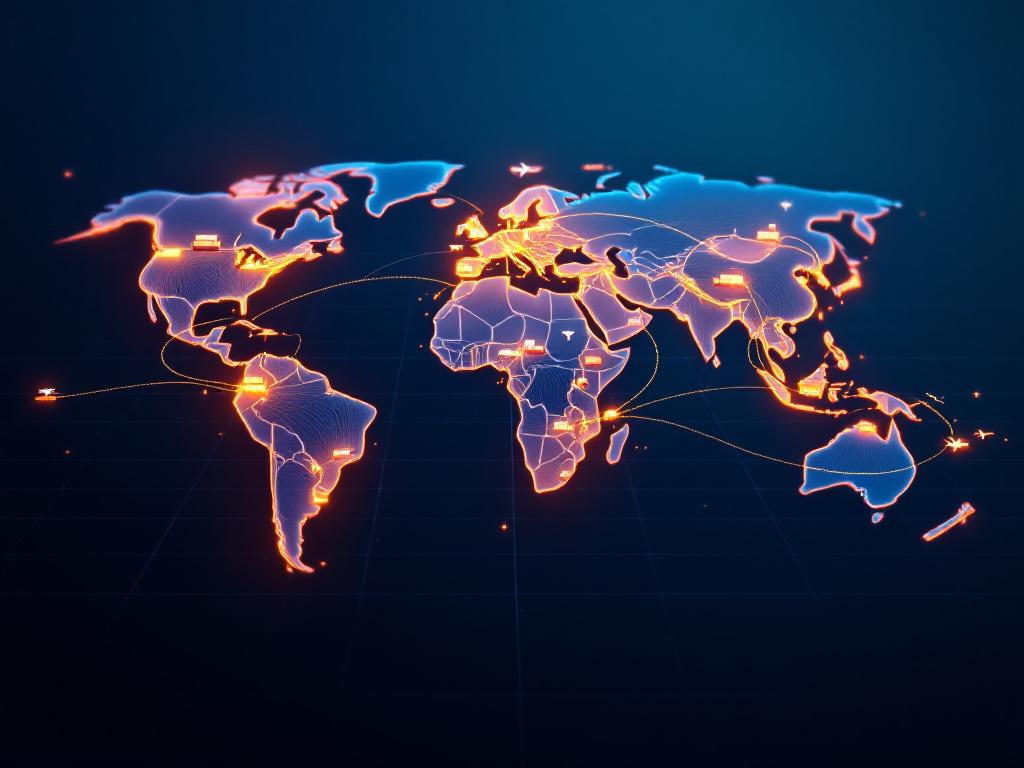As e-commerce continues to flourish, the need for efficient third-party logistics (3PL) providers becomes paramount. In this article, we explore the top 10 3PL providers that stand out for e-commerce businesses in 2025, evaluating their strengths, services, and how they can cater to diverse logistical needs.
Understanding Third-Party Logistics
In 2025, the e-commerce landscape is characterized by rapid changes in consumer preferences and market dynamics, making third-party logistics (3PL) providers essential partners for online businesses. E-commerce operations demand scalability, enabling companies to expand their reach without being hindered by logistics constraints. 3PL providers offer flexible warehousing solutions that can adapt to fluctuating inventory levels, allowing e-commerce businesses to scale up or down effortlessly.
Moreover, the efficiency brought by 3PLs significantly enhances operational performance. They streamline order fulfillment processes, ensuring quicker shipping times that meet the expectations of today’s consumers. With advanced inventory management systems, 3PLs allow businesses to maintain optimal stock levels, reducing costs associated with overstocking or stockouts. Additionally, 3PLs elevate customer experiences through reliable tracking and delivery services, ensuring that consumer expectations are met in an increasingly competitive e-commerce environment. This synergy between e-commerce and 3PLs is crucial for sustained growth and customer satisfaction in 2025.
Why E-Commerce Needs 3PL Providers
E-commerce businesses face unique challenges that make third-party logistics (3PL) providers essential partners in navigating today’s dynamic market landscape. One fundamental requirement is **scalability**. As e-commerce sales can spike dramatically during peak seasons, 3PLs offer flexible warehousing solutions that allow businesses to rapidly adjust their capacities without substantial investments in infrastructure.
**Efficiency** is another critical factor. By leveraging advanced technology and optimized fulfillment processes, 3PL providers help streamline operations, ensuring that orders are processed and dispatched with minimal delays. This is vital for maintaining customer satisfaction, particularly in 2025, when consumers expect faster shipping times.
Moreover, 3PLs enhance **inventory management** through real-time data analytics, helping businesses manage stock levels proactively to meet fluctuating demand. This capability not only reduces the risk of overstocking but also minimizes stockouts, which can lead to lost sales. Ultimately, partnering with a 3PL provider can lead to an **enhanced customer experience**, positioning e-commerce businesses for sustained growth in a competitive landscape.
Criteria for Choosing a 3PL Provider
When selecting a 3PL provider, e-commerce businesses must consider several critical factors to ensure a successful partnership. **Service offerings** are paramount; providers should have capabilities in warehousing, transportation, and order fulfillment tailored to specific business needs. **Technology integration** is also essential; a 3PL that uses advanced software for inventory management and real-time tracking can streamline processes and enhance operational efficiency.
**Reliability** is another key criterion. Assess potential providers’ performance metrics, such as delivery accuracy and turnaround times. **Customer service** cannot be overlooked—effective communication and responsive support can significantly impact your logistics operations. Furthermore, **geographical reach** should align with your target markets; a provider with a robust distribution network can optimize shipping times and costs.
To objectively evaluate providers, create a checklist aligned with these criteria and conduct thorough interviews and performance reviews to gain insight into each potential partner’s strengths and weaknesses.
Top 10 3PL Providers for E-Commerce in 2025
1. **ShipBob**: ShipBob excels in fulfilling e-commerce businesses’ needs with a robust network of fulfillment centers across North America and Europe. Their technology-driven platform integrates easily with major e-commerce platforms, providing real-time inventory tracking and data analytics. Ideal for small to mid-sized businesses, they offer flexible pricing models and exceptional customer support.
2. **Rakuten Super Logistics**: Known for their speed and reliability, Rakuten Super Logistics provides a seamless experience through their advanced technology and comprehensive fulfillment solutions. They are particularly strong in managing high-volume orders, making them a perfect choice for larger e-commerce brands aiming to scale efficiently.
3. **Flexport**: Flexport revolutionizes logistics with its technology-first approach, optimizing air and ocean freight services. Best suited for businesses with international shipping needs, Flexport excels in providing visibility throughout the entire supply chain, enhancing decision-making through analytics and real-time data.
4. **Red Stag Fulfillment**: Red Stag Fulfillment stands out for its specialization in heavy and bulky items, ensuring that e-commerce businesses handling such products can operate smoothly. Their commitment to quality assurance and damage-free delivery gives brands peace of mind and fosters customer trust.
5. **ShipMonk**: Leveraging customizable solutions, ShipMonk caters to e-commerce startups and large enterprises alike. Their focus on personalized service and the ability to scale operationally makes them ideal for businesses experiencing rapid growth. Advanced integrations with multiple platforms enhance overall efficiency.
6. **WarehousingOne**: This provider focuses on scalable warehousing solutions to accommodate fluctuating inventory levels. Their flexible contracts and strategic locations make them perfect for seasonal retailers or businesses launching new products that require quick, adaptive logistics solutions.
7. **XPO Logistics**: With a global footprint, XPO Logistics provides diverse logistics solutions ranging from transportation to last-mile delivery. Their technological innovations, like predictive analytics and AI, help streamline operations for e-commerce businesses aiming for maximum efficiency.
8. **Nanjing Logistics**: Nanjing Logistics specializes in e-commerce operations within Asia, supporting businesses seeking entry into the growing Asian market. Their local knowledge, strong relationships with carriers, and inventory management solutions position them as strong partners for global expansion.
9. **Easyship**: Easyship stands out for its comprehensive shipping solutions that cater to e-commerce businesses of all sizes. With a user-friendly platform offering multi-carrier integrations, they simplify cross-border shipping, helping businesses reduce costs and improve customer experience.
10. **DHL eCommerce Solutions**: As a recognized leader in logistics, DHL offers unparalleled expertise in enhancing global shipping operations. Their services are particularly advantageous for businesses needing streamlined international logistics, supported by reliable tracking and a strong reputation for timely delivery.
Case Studies: Success Stories with 3PL Providers
E-commerce company A, facing high shipping costs and inefficient order fulfillment, partnered with Provider X. Initially, they struggled with inventory management and order accuracy, leading to delayed shipments and dissatisfied customers. Provider X implemented an advanced warehouse management system that streamlined A’s inventory processes and improved picking accuracy. As a result, A noticed a **35% reduction in fulfillment costs** and a **20% increase in order accuracy**, significantly enhancing customer satisfaction.
In another example, Company B needed to scale quickly during peak seasons but faced challenges in managing labor and storage capacity. They collaborated with Provider Y, which offered flexible warehousing solutions and access to a robust labor pool. By utilizing Provider Y’s adaptive strategy, Company B efficiently managed increased demand, achieving a **30% boost in processing speed** and festive sales that surpassed projections. This partnership not only improved operational efficiency but also solidified Company B’s reputation for reliable delivery among customers.
Company C experienced difficulties with international shipping compliance. Partnering with Provider Z allowed them to navigate complex customs regulations seamlessly. Provider Z’s expertise resulted in **shortened delivery times** and **increased international sales**, boosting Company C’s overall growth and customer base.
The Future of 3PL in E-Commerce
As e-commerce continues to evolve rapidly, so too does the landscape of third-party logistics (3PL). The future of 3PL in e-commerce is significantly influenced by the integration of advanced technologies and innovative practices that not only streamline efficiencies but also enhance customer experiences.
Automation is at the forefront, with robotics and automated storage solutions providing increased speed and accuracy in order fulfillment. Artificial intelligence (AI) is reshaping decision-making processes, enabling 3PL providers to predict demand trends and optimize inventory levels better than ever. These technologies are essential for e-commerce businesses aspiring to maintain competitive advantages.
Another crucial trend is environmental sustainability. Increasingly, consumers are prioritizing eco-friendly practices, prompting 3PL providers to adopt greener logistics options. This includes optimizing transportation routes to reduce carbon footprints and implementing sustainable packaging methods.
As businesses look towards 2025, aligning with 3PL partners who embrace these innovations will be vital for achieving efficiency, cost-effectiveness, and elevated customer satisfaction.
Conclusions
Selecting the right third-party logistics provider is essential for e-commerce success in 2025. By considering the unique services and strengths of these top 10 providers, businesses can streamline operations, enhance customer satisfaction, and ultimately achieve growth in a competitive landscape.


